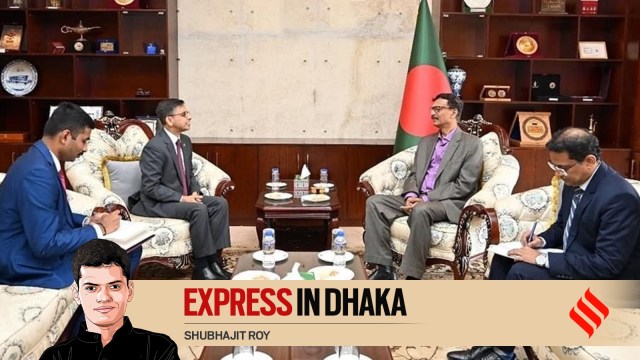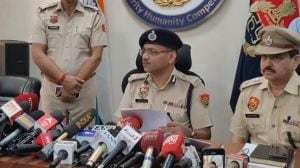The interim government of Bangladesh wants to work closely with India to promote bilateral relations, Foreign Affairs Advisor Touhid Hossain said Wednesday, but added that deposed premier Sheikh Hasina’s public statements from India are “not conducive” towards that.
Hossain’s statement came after his meeting with Indian High Commissioner in Dhaka Pranay Verma. This was the first time since the regime change in Bangladesh — after Sheikh Hasina fled to India on August 5 — that the Indian envoy met with the interim government.

Underlining more “people- centric engagement,” after what he called the “second liberation,” Hossain flagged Sheikh Hasina’s statement issued Tuesday and said “such statements emanating from India (are) not conducive to fostering better bilateral relations”, according to a release from the Bangladesh Foreign ministry.
Story continues below this ad
In her first public statement since her ouster on August 5, Hasina set the stage for a possible confrontation in Dhaka as she asked people to observe August 15 — the anniversary of the assassination of her father Sheikh Mujibur Rahman — as “national mourning day” by placing wreaths at the Bangabandhu Memorial Museum. This came on a day when the interim government had decided to cancel the national holiday on August 15.
With the Hindu minority in Bangladesh facing a string of attacks over the last week, Hossain, a former diplomat, also “affirmed (the) interim government’s commitment to ensure peaceful coexistence of different communities in Bangladesh including the minorities,” Dhaka’s readout of the meeting said.
According to the statement, Hossain mentioned that “the government is pledge-bound to ensure the safety and security of all religious and ethnic groups and will not tolerate any violence or intimidation against them. He added that all religious groups and other political parties are also working to ensure safety and security of the minorities.” He also referred to what he called “highly exaggerated media campaign about happenings in Bangladesh”.
Chief Advisor Muhammad Yunus, who is heading the interim government, had reached out on Tuesday with a visit to the Dhakeshwari Temple where he met community leaders and assured “justice” and “equal rights” for all.
Story continues below this ad
Hossain “particularly stressed on some key issues like stopping border killing, conclusion of Teesta Water sharing Agreement, and ensuring supply of essential commodities” — referring to some thorny issues between India and Bangladesh, especially border killings and the Teesta pact.
Verma, according to the Bangladesh Foreign Ministry, “congratulated the Adviser for Foreign Affairs on his new responsibilities. He referred to Prime Minister Narendra Modi’s good wishes to the Chief Adviser (Muhammad Yunus) and ‘expressed the keen willingness of the Government of India to work with the interim government in the coming days to fulfil the shared aspirations of peoples from both countries.” This formulation about “peoples” is a telling departure from the routine reference to government-to-government ties.
Hossain thanked “Government of India and Prime Minister Narendra Modi for his good wishes extended to the Chief Adviser on his assumption of his new responsibilities”, and briefed the Indian envoy “about the current situation in Bangladesh”.
“He mentioned that Bangladesh witnessed a second liberation last week through a mass uprising spearheaded by valiant students. The combined forces of the students and people have emerged victorious against the forces of authoritarianism and repression in their quest for ending discriminations and inequities,” it said, referring to the Hasina government’s ouster.
Story continues below this ad
Giving its account of the run-up to the ouster, the statement said that “the fearless student movement against a discriminatory public service recruitment system soon morphed into a nation-wide revolutionary struggle to establish a rules-based, just, fair and inclusive society. Nobel Laureate Dr Muhammad Yunus agreed to take the helm of the interim government at the request of the students and people.”
Hossain said that the “most pressing task before this interim government is to bring normalcy to the overall law and order situation and bring the economy on track. The government is working on meaningful reforms and a lasting transformation to fulfil the aspiration of the people, especially the youth. The government is committed to ensuring a transition to inclusive and pluralistic democracy and create an atmosphere to hold free, fair and participatory elections,” it said.
A 1981-batch Bangladesh Foreign Service officer, Hossain, 69, was Foreign Secretary of Bangladesh from December 17, 2006 to July 8, 2009 during the caretaker government and the first six months of Hasina government. He has served as High Commissioner of Bangladesh to South Africa. Hossain was Deputy High Commissioner of Bangladesh in Kolkata from 2001 to 2005 — during the Khaleda Zia-led BNP-Jamaat-e-Islami government.









